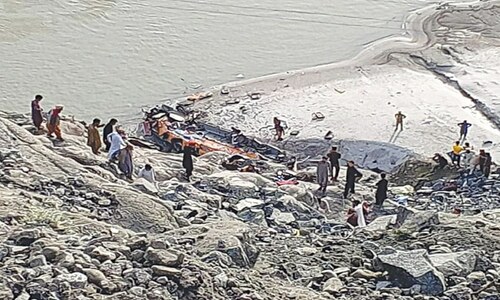WASHINGTON, May 27: A day after FBI memos revealed fresh allegations of desecration at Guantanamo Bay, Pentagon officials said they had identified at least five incidents of military guards and an interrogator “mishandling” the Holy Quran at the US prison facility.
The officials, however, characterized the episodes as minor and said most occurred before specific rules on the treatment of the holy book were issued in January 2003. Brig-Gen Jay Hood, Commander of Joint Task Force Guantanamo, told journalists that investigators had looked into 13 specific allegations of desecration at the prison dating to early 2002 and had determined eight of those to be unfounded, lacking credibility or the result of accidental touching of the holy book.
Of the five cases of mishandling, three were “very likely” deliberate and two were “very likely accidental,” he said. But Brig-Gen Hood declined to provide details, citing an ongoing investigation.
The comments mark the first time the Pentagon has acknowledged mistreatment of the Holy Quran at Guantanamo Bay. Captives and some military personnel there have made claims of desecration, but in a statement last week, Pentagon spokesman Lawrence Di Rita said the defence department had received no credible claims of such abuse. Nevertheless, he said, officials were reviewing the allegations.
Brig-Gen Hood, however, denied the Newsweek magazine report related to desecration, which has been retracted. The news conference came a day after the American Civil Liberties Union released summaries of memos from Federal Bureau of Investigation agents at Guantanamo Bay that reported detainee allegations of desecration.
A week after the White House denounced reports of desecration, declassified FBI records showed that as early as April 2002 detainees at the US prison had denounced the treatment of the Holy Quran by guards.
“Their behaviour is bad,” one detainee is quoted as saying in July 2002. “About five months ago the guards beat the detainees. They flushed a Holy Quran in the toilet.” The report, written by an FBI agent, continued: “The guards dance around when the detainees are trying to pray. The guards still do these things.”
The documents were released to the American Civil Liberties Union under the Freedom of Information Act. While the Pentagon had no immediate comment on the documents, ACLU lawyer Jameel Jaffer told journalists: “Unfortunately, one thing we’ve learned over the last couple of years is that detainee statements about their treatment at Guantanamo and other detention centres sometimes have turned out to be more credible than US government statements.”
ACLU Executive Director Anthony Romero said: “The United States government continues to turn a blind eye to mounting evidence of widespread abuse of detainees held in its custody.”
“If we are to truly repair America’s standing in the world, the Bush administration must hold accountable high-ranking officials who allow the continuing abuse and torture of detainees,” he said.
The ACLU said it made the Freedom of Information Act request in October 2003 and filed a lawsuit in June 2004 demanding the government comply.














































Dear visitor, the comments section is undergoing an overhaul and will return soon.